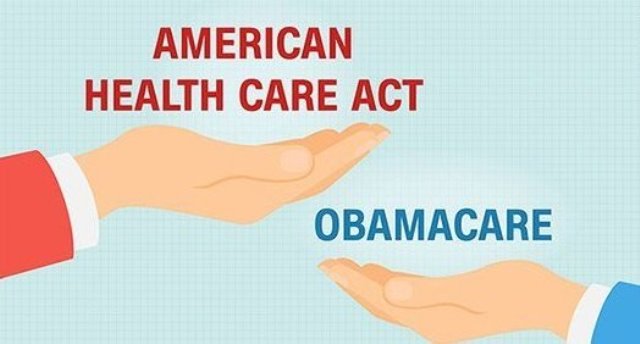Republicans will make another last-ditch effort Thursday to try and prove they are making progress on their signature promise to repeal and replace Obamacare before they leave home for a two-week recess, but time is running out.
According to a spokesman for the House rules committee, the committee will meet Thursday to put forward an amendment — from Reps. Gary Palmer of Alabama and David Schweikert of Arizona — that would restructure risk pools and has “widespread agreement” among Republicans on the Hill.
“While we are still working toward a final bill, there has been widespread agreement on an amendment to the (American Health Care Act) from Schweikert and Palmer that the committee will consider today,” the committee spokeswoman said. “We are still working on.”
The announcement came after House Speaker Paul Ryan and Majority Leader Kevin McCarthy met Wednesday night with President Donald Trump. Up until then, top leaders were telling members that the health care discussions would continue over the recess, but there had been no further action on the bill planned. Leaders had emphasized that members were still in the concept phase of the discussion.
Ryan and McCarthy huddled in the West Wing with Vice President Mike Pence, chief of Staff Reince Priebus, chief strategist Steve Bannon and Office of Management and Budget Director Mick Mulvaney.
“We told Ryan they needed to stay and work,” one senior administration official said.
By the end of the meeting, the group of top White House officials had made it clear that they needed a sign of progress and urged the House leaders to vote on at least one amendment Thursday in the rules committee to begin to flesh out the health care bill, the official said.
Ryan and McCarthy began to set things into motion as they left the White House and news began to spread to House GOP members and their chiefs of staff between 8 and 10:30 p.m. ET, two GOP sources on Capitol Hill said.
The chatter turned frantic as members of Congress fretted about the possibility of a floor vote on a health care bill that was still showing few signs of consensus. Among themselves, some members of Congress worried a floor vote on the health care bill would surely fail and could sink their prospects of remaining in the majority after the 2018 elections.
But for the White House, the mission was clear. Progress has been lacking as the White House has tried to reignite health care talks. And pushing for action days before members are set to return to their districts could help “focus everybody’s attention,” a senior administration official said.
“Some at the White House painted a dire picture for the party if we don’t get this done,” said a source familiar with the meeting said.
The amendment that will get a vote Thursday is a small step forward and comes from two members of the House Freedom Caucus, the conservative group of rabble rousers that has taken a large share of the blame for the bill’s collapse two weeks ago. But those members supporting Thursday’s amendment and were already supportive of leadership’s first bill.
While the details have yet to be released, the amendment would create a risk-sharing fund aimed at subsidizing the cost of sicker patients, such as those with cancer or diabetes. That would also likely lower premiums for others, one of the main goals of conservative members in the Freedom Caucus.
It’s also designed to placate more moderate members, who are concerned about diluting or eliminating Obamacare protections for those with pre-existing conditions. The Freedom Caucus has pushed eliminating several key provisions, including the essential health benefits and community rating, which ensure the sick can get comprehensive coverage at the same price as everyone else.
The amendment would be based on a now-defunct Maine’s risk sharing program, which created a so-called “invisible risk pool” several years ago. It kept consumers with pre-existing conditions in the traditional individual market, but reimbursed insurers for policyholders with high costs. The funding came from insurers and an assessment on policyholders. The program allowed the state’s largest insurer to introduce new, lower-premium plans, according to those involved in the effort. The program was phased out as the Affordable Care Act took effect.
While high risk pools are a favorite policy among Ryan and conservatives, they have a very checked past in the states where they existed prior to Obamacare. They were often underfunded, leaving members with high premiums or spotty coverage.
There still is not evidence of a major breakthrough.
A senior GOP House aide said that “while we’re still working toward a final agreement, progress was made this week on some new policy.”
“An amendment from Reps. Palmer and Schweikert would create a new risk-sharing fund that members across the spectrum of the conference are enthusiastic about. To keep advancing our efforts, the rules committee will meet tomorrow to markup language that would add this to the bill,” the aide said.



